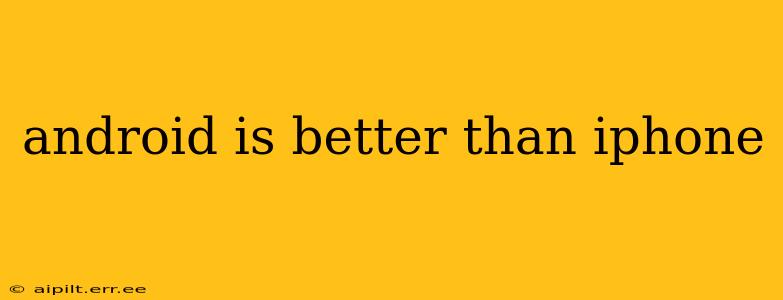Android vs. iPhone: A Deep Dive into the Smartphone Showdown
The age-old debate: Android vs. iPhone. Which operating system reigns supreme? The truth is, there's no single "better" option; the ideal choice depends entirely on individual preferences, needs, and priorities. This in-depth comparison explores the key differences between Android and iPhone, helping you decide which platform best suits you.
What are the main differences between Android and iOS?
This is a fundamental question that often sparks the debate. The core difference lies in the underlying operating systems and their philosophies. Android, developed by Google, is an open-source platform used by numerous manufacturers (Samsung, Google, OnePlus, etc.), leading to a vast array of devices with varying features and price points. iOS, developed by Apple, is a closed ecosystem, exclusively used on Apple's iPhones and iPads. This closed nature results in a more consistent user experience across all devices, but with less flexibility. Android boasts customization options, while iOS prioritizes simplicity and ease of use.
Which is better for gaming?
Both platforms offer excellent gaming experiences. Android's advantage lies in its wider range of devices, offering choices across various budgets, including high-end gaming-focused phones. iOS, while having a smaller selection, generally maintains high performance standards across its devices, ensuring a smooth gaming experience. Ultimately, the "better" platform for gaming depends on individual game preferences and hardware choices. High-end Android phones often boast superior processing power, while iOS typically offers a more consistent, optimized experience across its devices.
Is Android cheaper than iPhone?
Generally, yes. The Android market offers a much wider price range, catering to various budgets. You can find budget-friendly Android phones with decent specifications, while the entry-level iPhones tend to sit at a higher price point. However, high-end Android flagships can also reach prices comparable to, or even exceeding, top-tier iPhones. Therefore, while Android offers greater affordability at the lower end, the price gap narrows considerably at the higher end.
Which has better security?
Both iOS and Android prioritize security, employing robust measures to protect user data. However, the closed nature of iOS makes it inherently less susceptible to malware and viruses compared to the more open Android ecosystem. Android's open nature means more potential entry points for malicious software. However, Google has significantly improved Android's security features in recent years, and with regular updates and cautious app downloads, the security risk on Android can be minimized. The ultimate security level depends on user practices and software updates.
Which OS is easier to use?
iOS is generally considered easier to use, especially for beginners. Its intuitive interface and streamlined design make navigation simple and straightforward. Android, with its customizable options and wider range of features, can have a steeper learning curve. However, the ease of use also depends on individual preferences and technical expertise. While iOS offers simplicity, many users find Android's flexibility and customization a more rewarding experience.
What about app availability?
Both platforms boast massive app stores with millions of apps available. While both offer most popular apps, there might be minor differences in app availability or release dates. Both Apple's App Store and Google Play Store have stringent review processes, but the open nature of Android might mean more potential for unofficial or less-vetted apps.
Which has better battery life?
Battery life varies significantly depending on the individual device and its usage patterns. Generally, both platforms offer phones with excellent battery life; however, some Android devices, particularly those with larger batteries, might offer slightly longer battery life compared to iPhones with similar specifications. Ultimately, battery performance is largely dependent on the specific hardware and software optimization of individual devices, rather than the operating system itself.
Conclusion:
Choosing between Android and iPhone is a personal decision. There's no universally "better" option. Consider your priorities – budget, customization needs, ease of use, app preferences, and security concerns – to make an informed choice. Each operating system has its own strengths and weaknesses, catering to different user needs and preferences.
